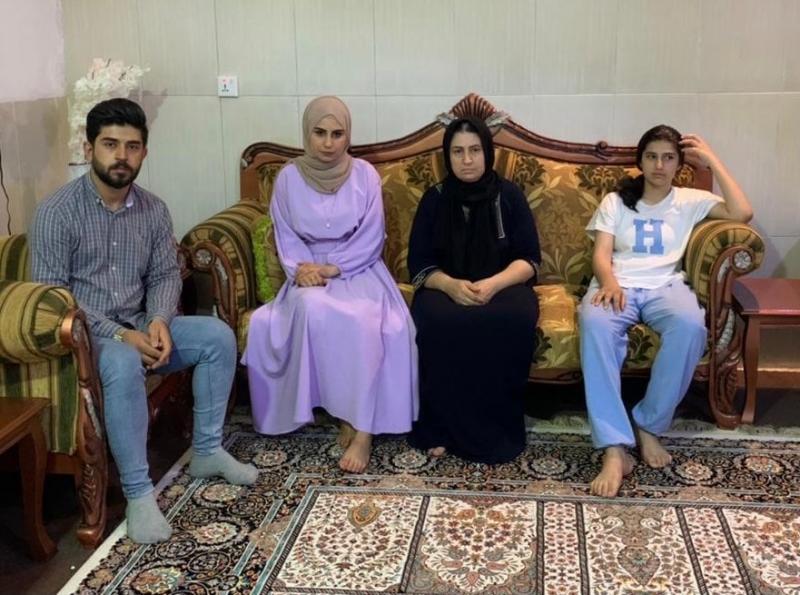In the upcoming weeks, nine journalists and activists will stand trial for unjust charges. The family members of these activists and journalists hope to see a just trial process and all prisoners released. One of the activists facing trial is Suleiman Kamal Suleiman, a father of four children and the husband of Fatima Haji. Suleiman’s eldest son, Amed, told CPT that his father was abducted and arrested on 6 September 2020. Amed reported that his father was accused and unjustly charged with anti-state activism for working with “some of his other friends in a political party called Coalition for Democracy and Justice.”
Amed believes that his father was arrested because he was not working for the Kurdistan Democratic Party (KDP), one of the ruling parties in Iraqi Kurdistan. When Amed’s father was protesting against the government’s corruption, Asaish security forces told him: “If you are not KDP, you should move to Sulaimani,” insinuating that Amed’s father should move away. “In Badinan, it is difficult to challenge the KDP—no one can challenge them,” said Amed.
Amed’s words have proven true based on what happened in the court trial on 15 and 16 February against five additional journalists and activists from Badinan: Sherwan Sherwani, Guhdar Zebari, Eyaz Karam, Shivan Saeed, and Hariwan Essa, all of whom have been sentenced to six years of prison. These court trials and their sentencing demonstrate that whoever wants to speak and take action against the injustice and corruption of the government will be severely punished. Fatima, Suleiman’s wife, told CPT that she and her children fear Suleiman’s fate will be the same as these five prisoners sentenced to six years in prison.
While in prison, Suleiman went on hunger strike with fellow prisoners, protesting their unjust incarceration. Amed was concerned about his father’s situation and was able to speak with him over the phone. Amed told CPT, “My dad called me once, and I asked him about the hunger strike. My father responded, ‘It doesn’t matter if we are on a hunger strike if they don’t give us food.’”
Since Suleiman’s arrest in September, Amed met once with his father on 6 January 2021. The Asaish allowed them to meet only for Amed to witness that his dad was still alive. The Asaish told Amed, “This is the first and the last time for you to see your dad.” When they met, Amed saw that his father was very malnourished. “His body was very weak, five or six Asaish officers were present with us and they were monitoring the conversation.”
Even though Amed’s father Suleiman has not committed any crime, he still faces judgment for practicing freedom of speech. Amed recounted an experience to CPT, “One day at the Iraqi Kurdistan parliament, a parliament member who was also a member of the human rights committee told me, “Your dad is a troublemaker.” I told him, “My dad was a Peshmerga. How can he be a troublemaker while now he wants to make change through nonviolence?’”
On 7 February 2021, family members of the Badinan prisoners gathered in front of the United Nations compound in Erbil to meet with UN staff members to advocate for their loved ones. Some of the families were coming from distant towns. Suleiman’s family was coming from Akre to join the other 70 family members. Suleiman’s 13-year-old daughter Avesta was one of the family members who joined the gathering. Since her father’s arrest, she has experienced much grief and trauma. When she came to the UN compound to advocate for her father, she was arrested with her brother Amed along with many other family members of the Badinan Prisoners.
The family members of the Badinan prisoners came to ask the United Nations Assistance Mission for Iraq (UNAMI) for support because of the harm their loved ones experienced for exercising their right to freedom of speech. They do not understand why no one from the UNAMI compound came out while Asaish officers arrested the families in front of the compound’s CCTV and broadcast on media stations.
Suleiman’s family are now preparing themselves for the day when their father will stand trial in July. When CPT spoke with Amed about the trial, he concluded the conversation with an invitation for the international community.
He said, “We want consulates and international organizations to be present on the trial day and advocate for the rights of all prisoners.”




